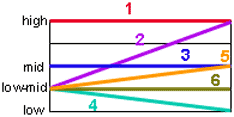I was in Hong Kong just 2 weeks ago for training. We know in the west that we spell "Wing" Chun and "Weng" Chun to distinguish between the two systems that use different Chinese characters for the "Wing" part. And I've always been told that they are pronounced the same way when speaking.
Weng 永 Forever, Eternal, Perpetual
Wing 詠 Sing, Hum, Chant, Praise
But I had more than one native speaker in Hong Kong tell me that this is not true. They said that "Wing" is indeed pronounced just as it would be in "chicken wing." However, "Weng" is pronounced like the "ea" in "mung bean." So there is a slight difference.
These are pronounced "Yong" in Mandarin. I'm told there are more tones in Cantonese than in Mandarin. So maybe this is where the idea that they are pronounced exactly the same came from...maybe they are the same in Mandarin, but slightly different in Cantonese. I didn't think to ask Sifu about this.
As Sifu was explaining the differences between the two systems he would switch back and forth between saying "Wing Chun" and "Weng Chun." At first I had a problem telling the two apart. But after a short while I could easily distinguish between the two.
Just thought I'd share. And before the naysayers chime in, I'll point out that my Sifu was born and raised in Hong Kong and is a native speaker of Cantonese and Mandarin and also speaks English very well.
Weng 永 Forever, Eternal, Perpetual
Wing 詠 Sing, Hum, Chant, Praise
But I had more than one native speaker in Hong Kong tell me that this is not true. They said that "Wing" is indeed pronounced just as it would be in "chicken wing." However, "Weng" is pronounced like the "ea" in "mung bean." So there is a slight difference.
These are pronounced "Yong" in Mandarin. I'm told there are more tones in Cantonese than in Mandarin. So maybe this is where the idea that they are pronounced exactly the same came from...maybe they are the same in Mandarin, but slightly different in Cantonese. I didn't think to ask Sifu about this.
As Sifu was explaining the differences between the two systems he would switch back and forth between saying "Wing Chun" and "Weng Chun." At first I had a problem telling the two apart. But after a short while I could easily distinguish between the two.
Just thought I'd share. And before the naysayers chime in, I'll point out that my Sifu was born and raised in Hong Kong and is a native speaker of Cantonese and Mandarin and also speaks English very well.
Last edited:



